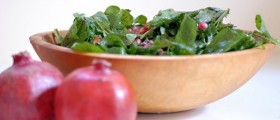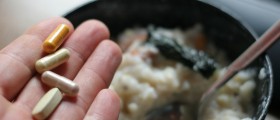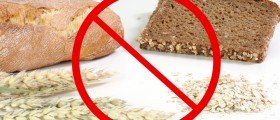
Celiac disease is an autoimmune disorder of the small intestine that strikes genetically predisposed people. Sings of celiac disease are chronic diarrhea, fatigue and growth problems in children. Celiac disease is triggered by reaction to gliadin, a gluten protein found in wheat and some other crops. The enzyme tissue transglutaminase modifies the protein, and the immune system reacts with the small-bowel tissue, causing an inflammatory reaction. The only efficient treatment for patients suffering from celiac disease is a lifelong gluten free diet.
Restrictions in diet
Anything made from wheat, rye barley or oats should be restricted from diet. This special regime of nutrition relieves the symptoms quickly but it must be continued for life. Withdrawal at any time could and probably will cause a relapse of symptoms. However, it is possible for medical examination to show that patient’s intestines have healed. In those cases patients will be permitted to eat small quantities of gluten from time to time. Patients should be aware of and avoid hidden sources of gluten in foods such as soy sauce, modified food starch, ice-cream, soup, or alcoholic drinks.Patients should also give up on milk and milk products because the deficiency of enzymes active in digestion might cause celiac disease in some patients.
Celiac disease may cause serious damage to that body can’t absorb nutrients from food. If this is the case, patients will need to receive intravenous nutrition in order to normalize bodily functions.If dietary regime doesn’t show successful patients might be prescribed with Prednisone – a steroid that holds back the body’s inflammatory reaction. However, this should be the last possible solution because it also has unfavorable effects on the immune system and the adrenal gland.
Dietary recommendations
Patients should eat plenty of raw fruits and vegetables and unrefined cold-pressed flax seed oil. This will provide help their bodies with digestive enzymes and omega-3 essential fatty acids, both required for normal metabolic functions.Acidophilus and bifidus supplements are well known of their beneficial effect to intestinal tract. These can reduce the development of gas and absorption of nutrients. Patients allergic to milk should choose diary-free products.
Digestive enzymes and other food supplements
Digestive enzymes serve to break down complex food substances into simple, resolvable and diffusible substances before they can be absorbed into the body. These enzymes are usually made from cow pancreas. Patients should refer to the product labels to find out the appropriate prescribed amount – usually one to three capsules with each meal.
Patients should also take vitamin and mineral supplements. Deficiency in vitamin B6 is somewhat accountable for symptoms of celiac disease. Patients should use Pyridoxal-5-Phosphate (P-5-P) an enzyme that catalyzes a number of reactions in the vitamin B6 metabolism pathway, to avoid the absorption difficulties often connected with digestive problems.A B-complex vitamin should also be supplemented. Vitamins A, D and E are found in multivitamin supplements, vitamin K can be supplemented through green foods. Vitamin C should also be supplemented to improve the immune functions.
Natural remedies
Homeopathic physician will prescribe a natural medication to enhance digestion and relieve the course of illness. Some of the most known remedies used in this case are:Silica – soothes inflammations of the abdominal tractMedical clay – encourages healing of the walls of the colonChina 12x or 5c – should be used as directed on the label for relief of abdominal gas and digestive difficulties.Lycopodium 12x or 5c – for short term help with low-bowel gas.

















Your thoughts on this
Loading...